A Trip Down Memory Lane for 10 of The UK’s Most Celebrated Music Venues

One of life’s greatest pleasures is experiencing live music. From seeing your favourite band live in concert to a more intimate gig at a music pub, as a past study identified, it creates the ultimate human connection.
Pub music venues are a valuable community asset however, sadly, grass roots music venues are in a state of decline. According to the Music Venues Trust 35% of GMVs have closed in the last 20 years.
With pubs accounting for many grassroot music venues, data released in October 2022 by real estate adviser Altus Group revealed that the number of pubs closing permanently had risen by 50% over the past three months as businesses struggle with the rising costs and bills.
With several iconic music venues across the UK, here at The Insurance Emporium we’ve compiled our list of ten renowned venues to highlight some of the famous faces to step onto their stage and reveal what has become of these venues today.
1. The Astoria Theatre on Charing Cross Road, London
Left photo by: Ewan Munro | Right photo by: Google Maps
The London Astoria was a music venue at 157 Charing Cross Road, in London.
It started out as a warehouse in the 1920s yet became popular in the 1980s after a redevelopment of the building which saw it transformed into a night club and live music venue.
The venue played host to several world class acts including Nirvana, U2, Manic Street Preachers and Oasis.
Sadly, in January 2009, the Astoria closed its doors for the last time, having been subject to a compulsory purchase order for the Crossrail development.
2. The Roadhouse, Manchester
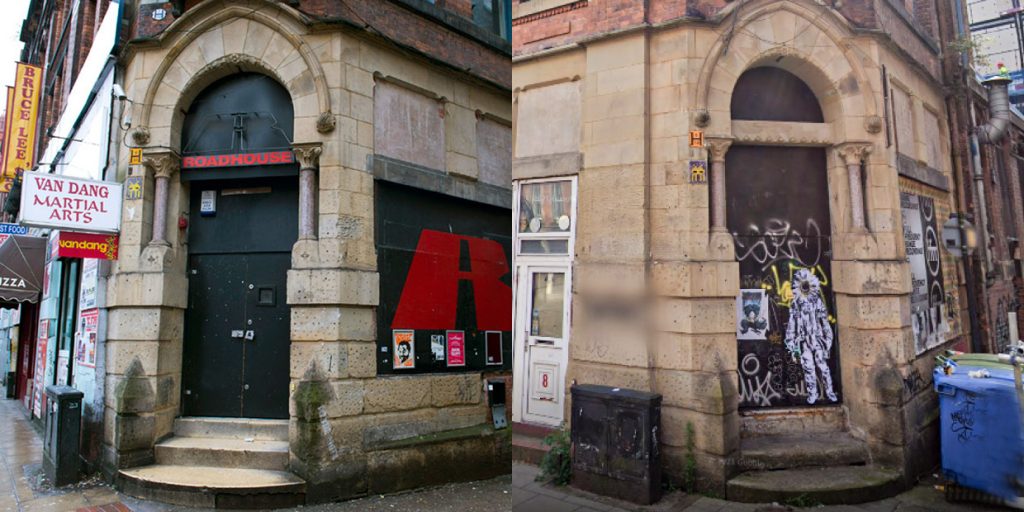 Left photo by: Manchester’s Finest | Right photo by: Google Maps
Left photo by: Manchester’s Finest | Right photo by: Google Maps
Situated on Newton Street, Manchester the Roadhouse Manchester was a basement club that over its 22-year reign saw the likes of The White Stripes, Coldplay, Fleet Foxes, The Kills and Muse. Most notably – one of Manchester’s greatest exports ‘Elbow’ played their first ever gig at the venue.
The venue was closed for good in May 2015 with the owner announcing it would become a restaurant. However, that never happened, and it’s still left unknown what will become of one of Manchester’s fondest music venues.
3. The Boardwalk, Sheffield
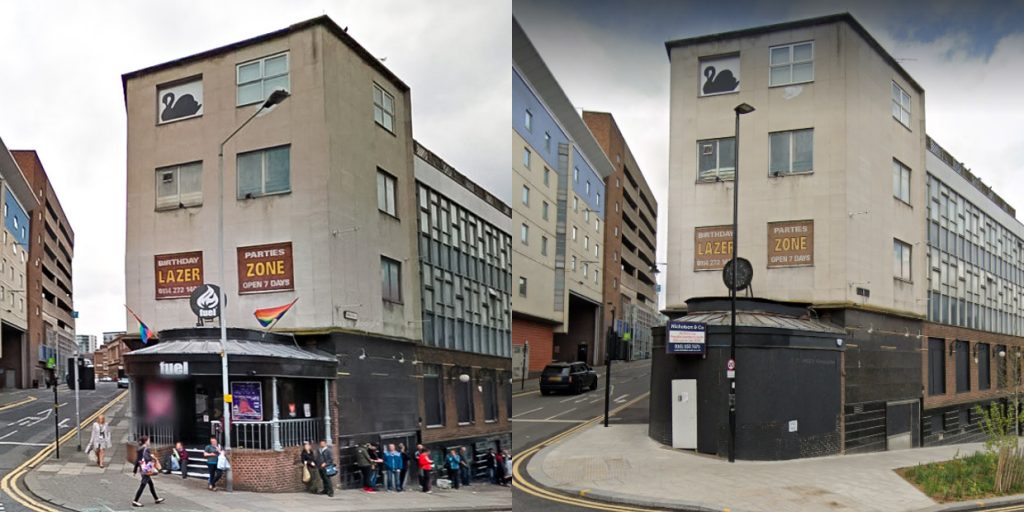 Left photo by: NME | Right photo by: Google Maps
Left photo by: NME | Right photo by: Google Maps
Moving on to South Yorkshire we’ve got The Boardwalk in Sheffield. This cherished venue started off as a jazz club known as the Black Swan back in the 1930s. It became known locally as the ‘Mucky Duck’ and that wasn’t exclusive to the venue’s regulars but also the bands themselves.
Based on Snig Hill, the Boardwalk is also where the Clash played their first ever gig, and Joe Cocker was on stage as his single went to number one.
The venue was heavily influential to the Steel City’s very own Arctic Monkeys. Frontman Alex Turner was a former bartender of the club, and the band even named its first demo ‘Beneath the Boardwalk.’
After calling ‘last orders’ in December 2010 the venue has remained closed ever since. Yet, in 2021 Sheffield Council accepted a bid to name it as an ‘asset of community value’ (AoCV) meaning it could be protected from development.
4. The Duchess of York, Leeds
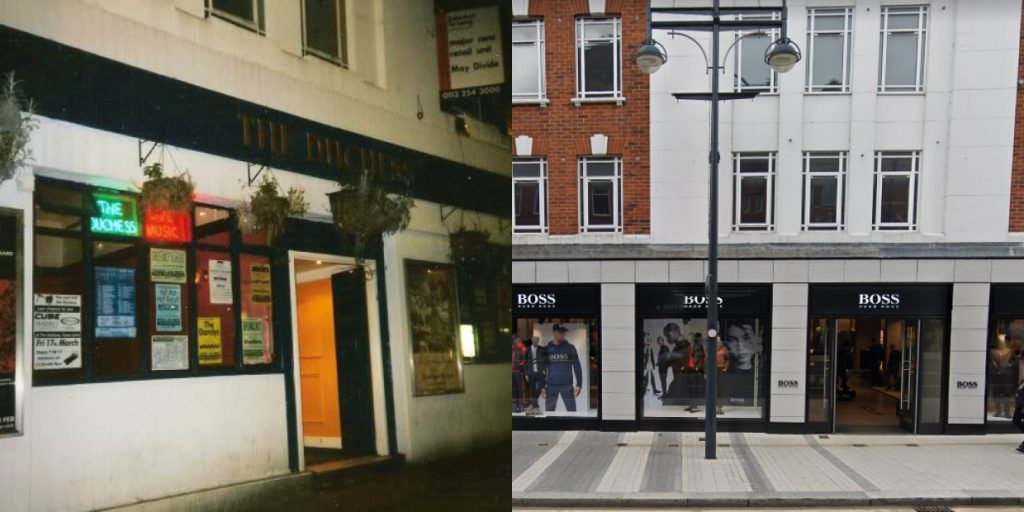 Left photo by: My Dad Rocks 247 | Right photo by: Google Maps
Left photo by: My Dad Rocks 247 | Right photo by: Google Maps
‘The Duchess’ or ‘The Duchess of York’ as it was also known as, on Vicar Lane, was one of Leeds’ most highly regarded music venues until its closure in 2000. One its biggest claims to fame was that Nirvana performed there before they were propelled to fame.
The venue has since been transformed from a pub to the designer clothing retailer ‘Hugo Boss.’ It’s hard to imagine that before this immaculate, high-end shop was a gritty Yorkshire pub that welcomed the likes of Blur, Manic Street Preachers, Radiohead, and Coldplay.
Bringing back a piece of nostalgia the pub was reincarnated in 2021 in the form of a pop-up in Leeds’ Kirkgate Market for the Compass Festival.
5. The Picture House, Edinburgh
 Left photo by: Facebook | Right photo by: Mike Shaw
Left photo by: Facebook | Right photo by: Mike Shaw
Caley Picture House in Edinburgh has truly stood the test of time and is somewhat of an historical artefact to early cinematic theatre to the Scottish city. It opened its doors as an auditorium in 1923, originally seating 900 people yet increased its capacity to 1,900 shortly after in 1928.
In 1984 the historic cinema closed and by 1985 it was converted into a discothèque. Now a live performance venue it was renamed Caley Palais and across the 70s, 80s, and 90s welcomed live performers including Pink Floyd, Robin Trower, Wishbone Ash, Hawkwind, The Smiths, Queen, Beck, and AC/DC.
Its journey as a live music venue came to an end in 2014 and the building became a J.D Wetherspoons pub in 2016. As you can see from its exterior, although it has traded its weekly live music for a weekly curry club it still yields much of historic past.
6. The Odeon, Nottingham (Angel Row)
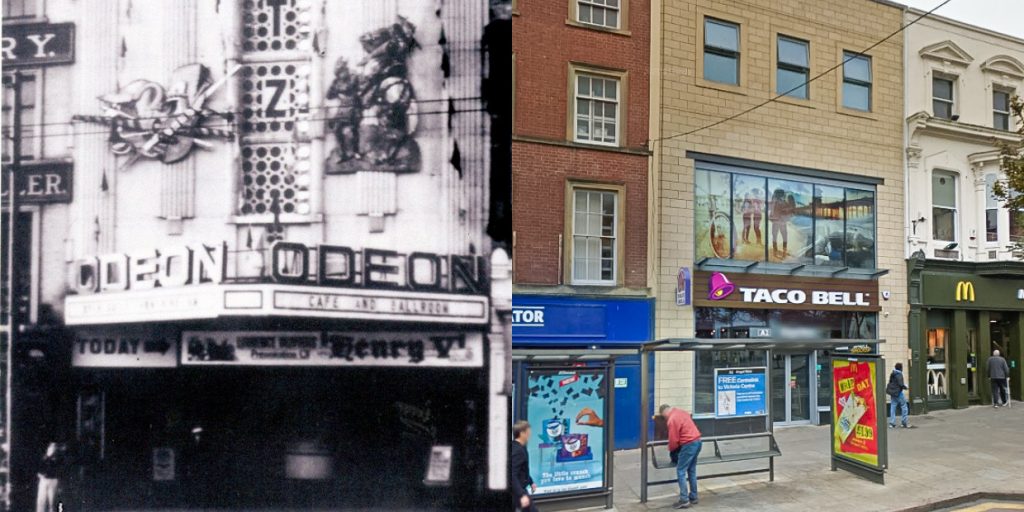 Left photo by: Nottingham Post | Right photo by: Google Maps
Left photo by: Nottingham Post | Right photo by: Google Maps
Nottingham’s famous picture house opened its doors in 1933 as a single screen cinema known as ‘The Ritz’.
After being acquired by The Rank Organisation, Odeon Theatres, the venue became known as The Odeon on Angle Row and after major refurbishment in 1964 it became the UK’s first twin-screen cinema, and it was at this point, during the 1960s it became popular for music events.
The Beatles played there in 1963 with other notable acts to grace its stage such as Roy Orbison and Buddy Holly.
The Odeon cinema chain was sold off by the Rank Group in 2000 and while some cinemas survived Nottingham’s cinema on Angel Row was officially closed for good in January 2001.
The building stood empty for many years before it was demolished and replaced by a residential development with a Taco Bell currently underneath it.
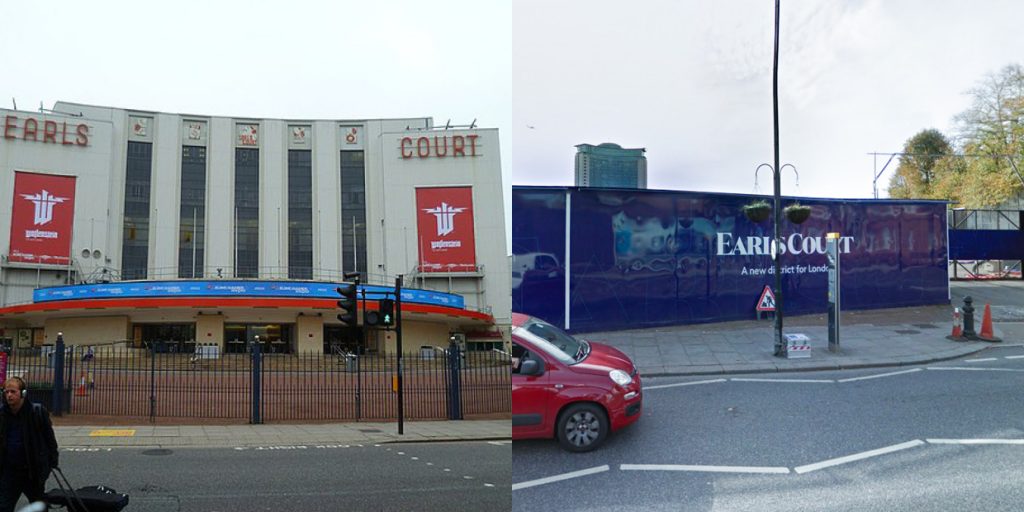 Left photo by: Shazz | Right photo by: Google Maps
Left photo by: Shazz | Right photo by: Google Maps
Another historic London venue that many of us will have been to if not heard of is Earls Court. The exhibition hall played host to decades of events and live music shows for some of the world’s biggest artists as part of their arena tours including Westlife, Pink Floyd, and Led Zeppelin. It was also how the UKs annual awards event – the Brit Awards up until 2010.
Plans to demolish the venue were drawn up in 2008 and subsequently were approved in outline by two local authorities in 2013.
Demolition work began on the site in December 2014 following its closure on the 13th of that same month. The final event in the main Earls Court was a concert by indie rock band Bombay Bicycle Club. The final event to be broadcast from the venue was the 2014 BBC Music Awards two days earlier.
8. The Charlotte, Leicester
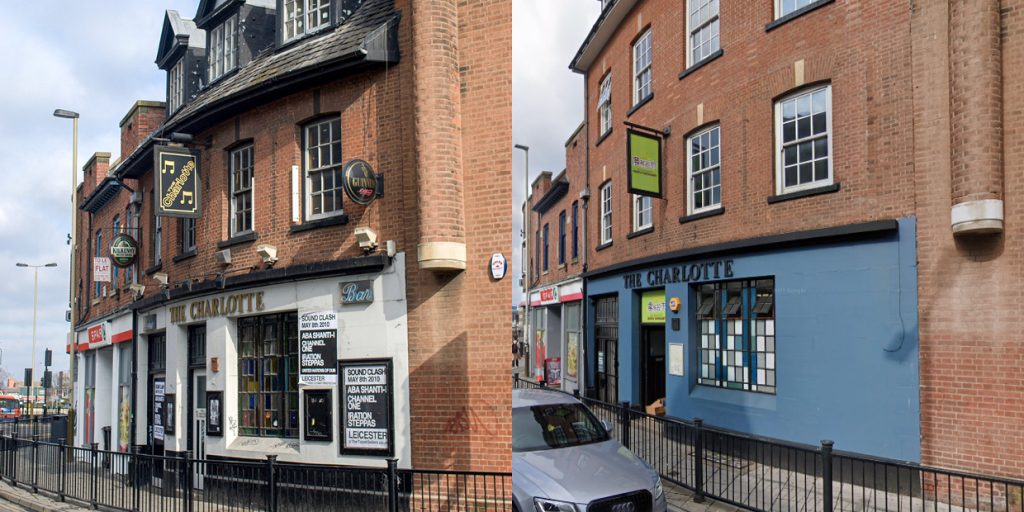 Left photo by: NotFromUtrecht | Right photo by: Google Maps
Left photo by: NotFromUtrecht | Right photo by: Google Maps
This quintessential British pub on Oxford Street, Leicester started out as ‘The Princess Charlotte’ and for several years it was just that – a pub. However, in the 1970s it started to dip its toes into live music water, initially offering a soundboard to local grassroot music artists.
By 1990 the pub dropped ‘Princess’ from its name and until this day is known as ‘The Charlotte.’
A renowned venue on the live-music circuit it played host to many famous artists over the years such as Blur, Carter USM, Radiohead, Elastica, The Cranberries, Pulp, The Proclaimers, The Stone Roses, Jayne County & The Electric Chairs, The La’s, Spiritualized, The Killers, Bloc Party, The Arctic Monkeys, Brian and the Teenagers, Macavity’s Cat, Demented are Go, Kingmaker, Oasis, The Libertines, The Offspring, Razorlight, The Buzzcocks, Primal Scream, Muse, Biffy Clyro, Foals and Kasabian.
Between 2009 and 2017 The Charlotte was open and closed under several changes of management until it was finally converted into a supermarket.
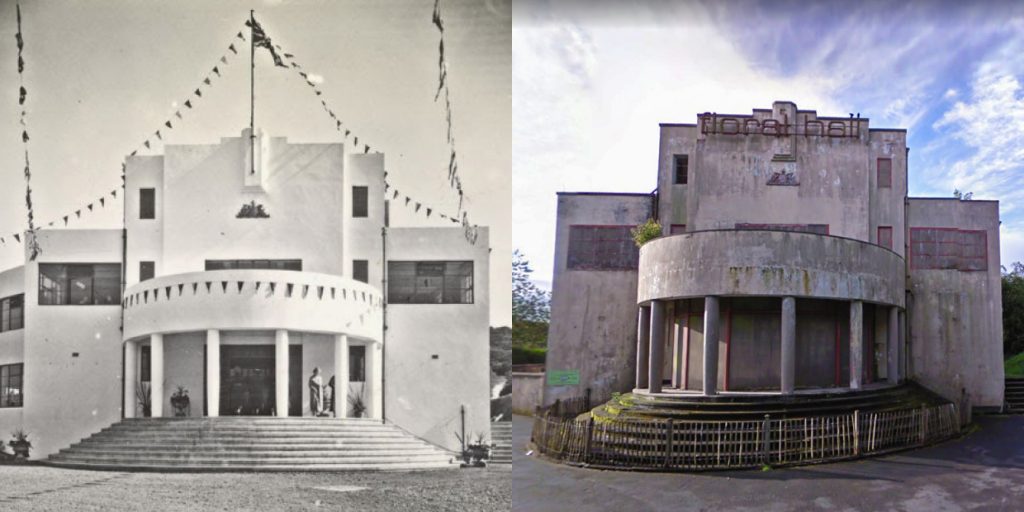 Left photo by: Lord Belmont in Northern Ireland | Right photo by: Google Maps
Left photo by: Lord Belmont in Northern Ireland | Right photo by: Google Maps
Situated within the grounds of Belfast Zoo, the Floral Hall started out as a ballroom in 1936. It later added a café and roller skating to its list of facilities.
In the 1960s, the hall was visited by musical artists such as Pink Floyd and Small Faces.
The Floral Hall closed to the public on 2 April 1972 and has been left in a state of disrepair ever since. However, in the 1990s the Floral Hall was given Listed Building status.
It is hoped by the local community that the building will be restored back to its former glory in the not-too-distant future.
10. Capitol Theatre, Cardiff
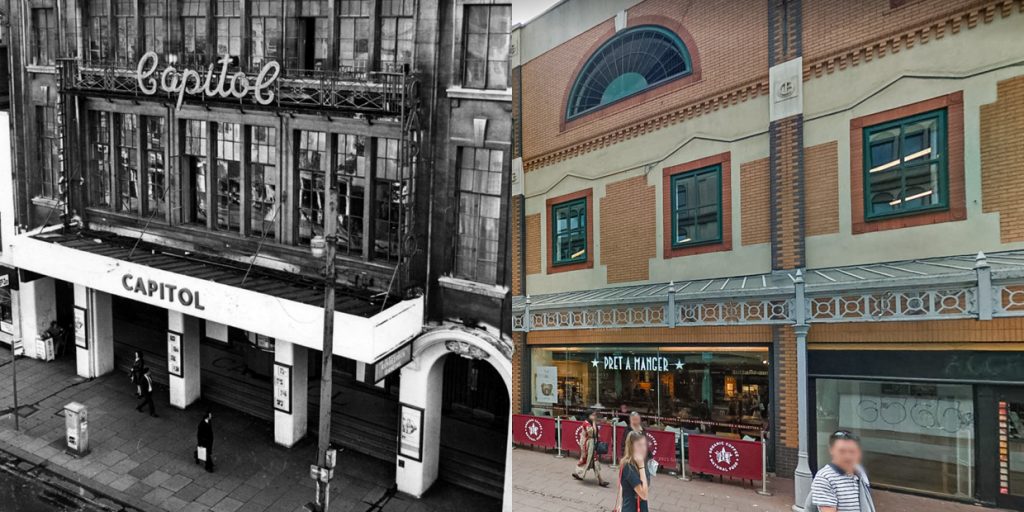 Left photo by: Keep Cardiff Live | Right photo by: Google Maps
Left photo by: Keep Cardiff Live | Right photo by: Google Maps
Another former auditorium to end our list is none other than Cardiff’s former Capitol Theatre. Opening in 1921, at the time it was the largest purpose-built cinema in Europe.
Some of the noteworthy artists that played at the theatre included the likes of Tom Jones, The Beatles, Queen, Led Zeppelin, Santana, Elton John, Rod Stewart, T.Rex and Bob Dylan.
The Beatles’ last live UK tour concluded with two performances at the theatre on the 12th of December 1965 while Santana’s only shows in Wales were here on the 7th of September 1975.
Only a few years later was theatre closed in 1978 and it was later demolished in 1983. The theatre’s former site was then redeveloped into the Capitol Centre.
The future of live music venues
Looking through the archives gives a real sense of nostalgia and highlights the importance of how even the smallest of music venues can support the music scene’s next-big-thing.
Here at The Insurance Emporium, we’re all about protecting both amateur and professional musicians with our musical instruments policy. We offer a range of tweakable music insurance policies from £1.61* per lunar month, visit the website for more info, or for a free, no-strings quote and get a 25% introductory offer.
*This is based on Musical Equipment insured up for £100 with no Optional Benefits selected including introductory discount.
All content provided on this blog is for informational purposes only. We make no representations as to the accuracy or completeness of any information on this site or found by following any link on this site. We will not be liable for any errors or omissions in this information nor for the availability of this information. We will not be liable for any loss, injury, or damage arising from the display or use of this information. This policy is subject to change at any time.
We offer a variety of cover levels, so please check the policy cover suits your needs before purchasing. For your protection, please ensure you read the Insurance Product Information Document (IPID) and policy wording, for information on policy exclusions and limitations.







